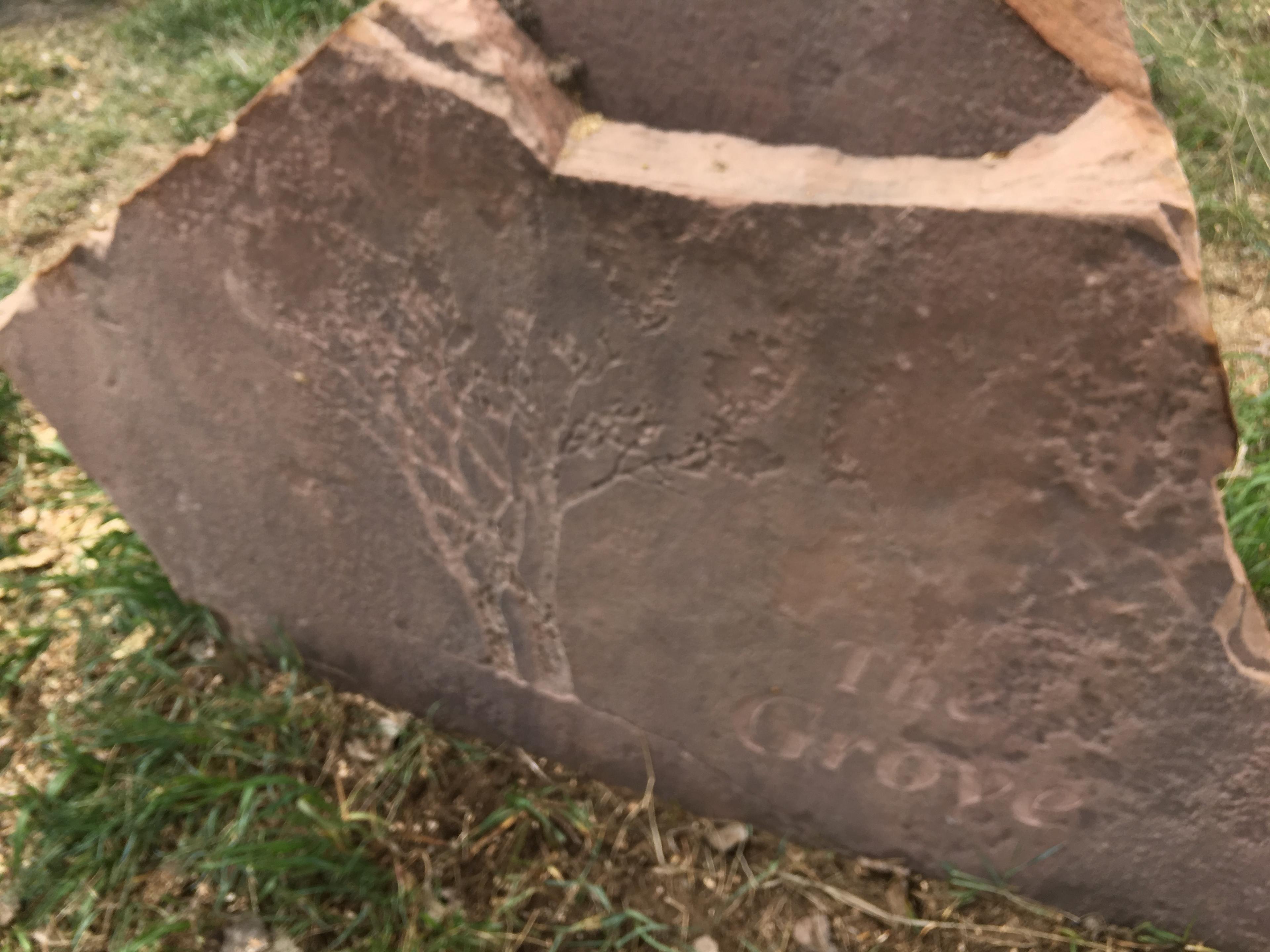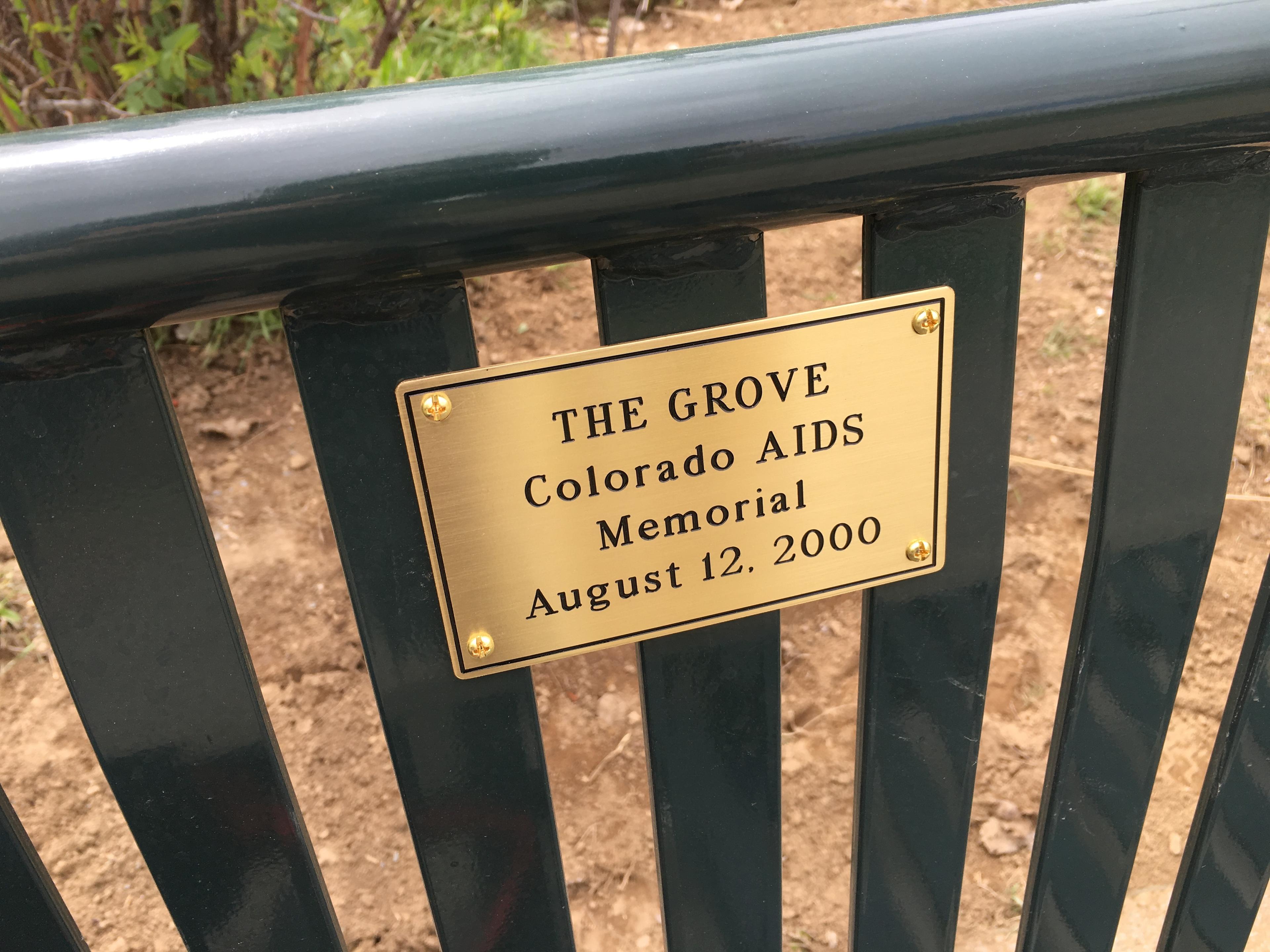

In the heart of Denver, there is a memorial to people who have died in the AIDS epidemic. The Grove, as it's known, has gone largely unnoticed and mostly untended for years.
Now, some of the people who were hit hardest when the health crisis struck Colorado in the 1980s are trying to change that. They've been cleaning up the space and plan a rededication ceremony Sunday.
The Grove is in the southeast part of Commons Park. A winding path leads down from street level to a humble stone marker and bench. It was dedicated August 12, 2000.
"I know it's true that many people have no idea that this place exists,'' said Phil Nash of Denver. "Because after it was dedicated in the year 2000, it was forgotten."

In 1981, Nash wrote an article about a unique kind of pneumonia that was striking gay men. It would come to be known as AIDS. "It felt like we were getting news that the planet was being invaded," he said. "It was science fiction to hear that there might be an epidemic that was targeting a very specific group of people."
Pat Gourley was nursing manager at Denver Health's AIDS clinic for 20 years, including at the height of the epidemic.
"One, I'm HIV positive, so this sort of space is very important to me personally," he said. "And then I go to San Francisco frequently and they have a wonderful AIDS grove there. Just calm space in the middle of the city. It's good for anybody. And it's sort of a place to just hopefully come and sit and be able to contemplate, you know, all those bigger questions and all those trials and tribulations that we all experience."
Rededication ceremonies are set for Sunday from 2 p.m.-4 p.m. at Commons Park, 2101 15th St. in Denver.
Colorado Matters host Ryan Warner visited The Grove on a cleanup day and spoke with Phil Nash about the early days of the AIDS epidemic. Nash was among the first in Colorado to make note of the emerging crisis. Phil Nash: I might have been the first person to write about this new epidemic for Out Front magazine, at that time, in 1981. And I later became involved with the Colorado AIDS Project and served as the first board president when it became an independent 501(c)(3) organization. Ryan Warner: And what do you remember about that time? About writing that first article and what was your head space then? Nash: It felt like we were getting news that the planet was being invaded. It's -- it was science fiction to hear that there might be an epidemic that was targeting a very specific group of people. Warner: People, who I imagine were your friends and loved ones. Nash: Very much my friends and loved ones. My partner of the last 42 years, now my husband, Dr. Bob Janowski, was treating gay men at that time in his practice. And he was beginning to see a lot of the people with initial symptoms during the mid-1980s become sick and he would be with them until they died. What I would say, kind of in retrospect, is that in my early-to-mid 30s, I experienced what many people experience toward the end of their lives. You're seeing the people that you might live to grow old with dying, and I probably lost 50 or 60 friends and acquaintances that way. Warner: Not an experience you're supposed to have in your 30s, you're saying. Nash: My 30s and 40s, that's correct, yes. Not an experience that, it's very hard to describe in retrospect. You know, in some ways, you just move on with your life. In other ways, you'll never be able to recover from that kind of loss. Warner: And I'm not even sure how you muster up the energy or the courage to go to that many memorial services, trying to find the reservoir for that. Nash: Some of us just weren't able to go to all of them. I mean, we had jobs and, you know, so I remember one time, in one of my jobs as a writer for an organization, I knew a funeral was in progress that I couldn't go to, and I just burst into tears when I was sitting at my work station at my job. And I just couldn't tell anybody why I was so upset. Warner: Why couldn't you tell anyone? Nash: I think that there was sort of this sense of disbelief. It was, I didn't want to be different than other people, so, but the fact that I was living this kind of nightmare was not something I really wanted to share with people I worked with. Warner: Did that have to do with stigma, at the time, as well? Nash: Well, I have always been out as a gay man, so I don't think it was so much stigma. I didn't want to be the Debbie Downer in the office, you know. And it wasn't every day, but it was often enough. I was asked once to preside at a funeral, and one of the things that was really pretty disturbing, and I look back on it now and I went, 'oh my gosh' -- a former lover of his came up and started ripping out the flowers that were on the altar and doing a speech from Shakespeare. He was an actor and so he had a lot of drama but it was, there were a lot of crazy things like that. You know, it was surrealistic in many ways. Warner: Yeah, what do you think that was about, that display? Nash: The memorial services and funerals for a lot of people who died in that time took on an inventive quality, making it lighter, making it a little bit lighter by letting go of balloons and not thinking of them as funerals, but as celebrations of life. Because so much was lost. One of the reasons I'm involved with the AIDS Grove is, when you think about the 6,000 people who died in Colorado of AIDS up to most recently, most of them died in the '80s and '90s, but if each one of them had only another 20 more years to live, which is a very conservative estimate, that's 120,000 years of life that has been lost. That's 120 centuries, which is almost as long as human beings have been on this earth. To not memorialize that massive loss of creativity, the friendships -- and it's not just the artists and the writers and the physicians and so forth, but it's the grocery store clerk, it's the bus driver. It's the taxi driver. It's the person you see every day on the street and say hello to but you don't even know their name, and then one day they're gone. Those are the people that this memorializes. Warner: There's one gentleman who was really critical to (creation of) The Grove, is that right? Tell me about him. Nash: Yes. In 1993, a man named Doug McNeil, who was a Realtor here in Denver passed away. He died of AIDS and, at the very end of his life, he said to his friends, 'I would like you to create a place in Denver where people can go and think about those that they have lost, a quiet place, a meditative place, just to contemplate what these lives have meant.' And so, his friends, a group of seven or eight people, formed a nonprofit organization and raised money over several years and then began working with the city to create this place that we are right now. Warner: And this place that we are right now, I imagine lots of people walk by it with no idea of what it symbolizes. Do you think that's true? Nash: I know it's true that many people have no idea that this place exists. People who come here, people who have connections to the HIV and AIDS community, because after it was dedicated in the year 2000, it was forgotten. It was a time, still, in the year 2000, when the stigma of AIDS made it difficult to talk about these issues. And I felt, several of us felt, a duty to come down and begin taking care of this place and to let more people know about its existence, so that they may benefit from the consolation of what it may bring to them, each as an individual. Warner: You did a lot of raking today, and what did you turn up in cleaning this place up? Nash: Well, I turned up a lot of candy papers, a lot of dead leaves, and a few needles. Warner: As you cleaned up today, were there people you had in mind that you were sort of carrying with you? Nash: Well, certainly, one person that I think of often is a good friend who was a Methodist minister who got AIDS and was my good friend for probably close to 20 years. He lived for quite a long time with his disease, but he died in 1995, and he's somebody whose picture is still up in my house. Warner: Do you ever have the thought, 'gosh, there but for the grace of God go I?' That is to say you lost so many friends and you're still here. Nash: Yes, there is no particularly good reason why I'm here and others in my generation are not. But that gives me a sense of responsibility to their memory. |








